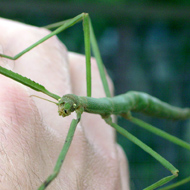Weird and wonderful rescues of 2014

A praying mantis, a wallaby and an emu are among the most unusual animals to be rescued by the RSPCA last year.
Other weird and wonderful creatures to be rescued were an axolotyl, crabs, marmosets, a wolf, stick insects and a rare panther chameleon.
A whopping 27 tarantulas were also helped by the charity, as well as a deadly funnel web spider.
A red lory called Romeo caused quite a flap last year when he escaped from his home and was caught tucking into a slice of watermelon at a local fruit and veg shop.
The charity also took in a seal - later named Dumbledore - who was mysteriously found on a farm 20 miles from the sea.



 The RCVS has announced a new version of its 1CPD mobile app, with enhanced features for veterinary surgeons and veterinary nurses to record their continuing professional development.
The RCVS has announced a new version of its 1CPD mobile app, with enhanced features for veterinary surgeons and veterinary nurses to record their continuing professional development.